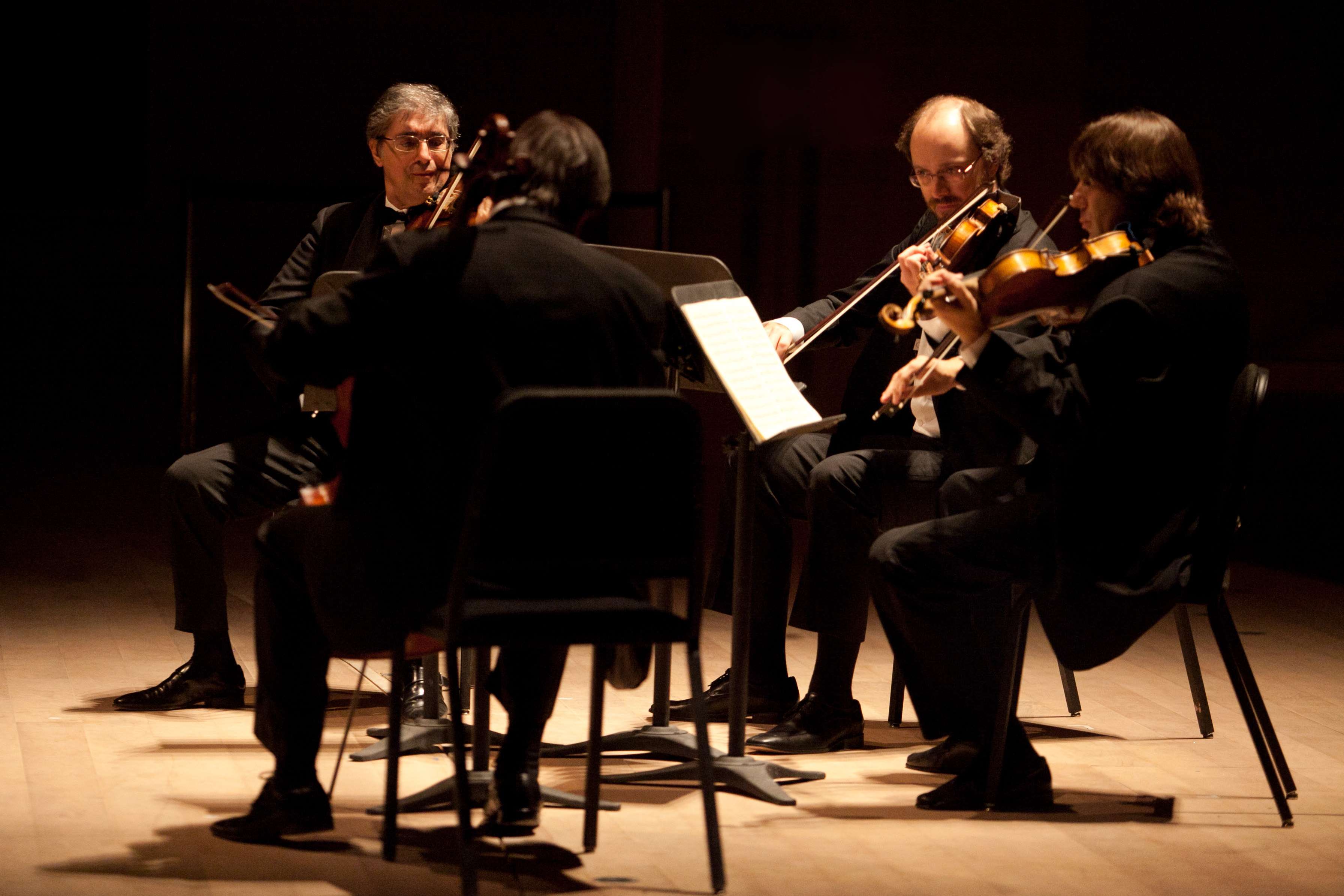|
Back
Borodin Quartet Commemorates 09/11 in Montréal’s New Hall Montréal
Maison symphonique de Montréal, Place des Arts
09/11/2011 -
Ludwig van Beethoven: String Quartet No. 15 in A minor, opus 132
Dimitri Shostakovich: String Quartet No. 15 in E-flat minor, opus 144
Borodin Quartet: Ruben Aharonian (First violin), Sergey Lomovsky (Second violin), Igor Naidin (Viola), Vladimir Balshin (Cello)

The Borodin Quartet (© LuceTg.com)
On September 11 just over 300 Montréal music lovers were privileged to hear the august Borodin Quartet in an intimate stage setting of Montréal’s new Maison symphonique de Montréal. As part of its inaugural concerts (this is the second of the three I’m attending during the opening week’s festivities) the Orchestre symphonique de Montréal (OSM) invited the Borodin Quartet to commemorate the tenth anniversary of September 11, 2001. Patrons were seated in a semi-circle in the choir loft and on the stage around the Quartet; the rest of the house was dark. This seating (I was in the second row of chairs placed about 20 feet from the Quartet) gave me a different perspective from which to experience the new house’s acoustics than on last Wednesday’s opening night.
The program was equally august–two late, great masterworks from two composers who were acutely suffering near the end of their lives. Beethoven had originally planned a traditional four movements for his String Quartet No. 15 in A minor, but while working on it in 1824-25 he became gravely ill with liver and bowel disease. Fearing he wouldn’t recover, Beethoven wrote a long central movement entitled “Heiliger Dankgesang eines Genesenen an die Gottheit, in der lydischen Tonart” (Holy Song of Thanksgiving to the Divinity by a Convalescent, in the Lydian mode).
The Borodin played the 45-minute work with astonishing ease but serious intent. Its balance was flawless and each instrument had a distinctive voice that infused the dialogue among them. The Quartet performed the four outer movements in a clear, singing, almost cryptic style. The central “Heiliger Dankgesang”, with its three hymn-like sections interspersed with two lighter sections bearing rays of hope, offered agile trills from the first violin, heartfelt resonance from the cello, mellow tones from the viola and profound engagement among all the musicians. The Quartet tore into the final rondo which it rendered with extraordinary virtuosity. The overall sound of the performance was clear and precise but dry. In thinking that this dryness was due to the hall’s acoustics, however, I was proven wrong by the Shostakovich which showed them to be clear and reverberant.
Shostakovich’s String Quartet No. 15 in E-flat minor was the composer’s last quartet and it is the most deeply felt and anguished of the fifteen. Its six movements are played without a break and are marked Adagio except for the fifth which is Adagio molto. Shostakovich instructed that the first movement be played “so that flies drop dead in mid-air and the audience leaves the hall out of sheer boredom.” I can assure you that no flies dropped dead last night (we would have heard them hit the stage floor) and no one walked out. The mournful intensity and sheer silken beauty of the first movement (“Elegy”) kept patrons riveted to their seats. The shearing shrieks from the violins and viola in the second movement (“Serenade”) could have raised the dead. Throughout, the Quartet sustained tight tension and control that drew the audience into the heart of the composer’s world of anguish and sorrow. The playing in this quartet, although still transparent and hypnotizing, had greater depth than in the Beethoven. The musicians leaned into their instruments, drawing deeper, profounder sounds that filled the hall with a warmer resonance. The darkened hall (except for the musicians’ reading lamps draped with black cloth) contributed to the sense of loss and tragedy that permeated the performance right up to the despairing morendo of the final movement.
A spokesperson for the OSM, in her opening remarks to the audience, noted that the Quartet had requested that applause be withheld until the end of the program and after the house lights went up. Nevertheless, this request was ignored.
The Borodin Quartet
Earl Arthur Love
|